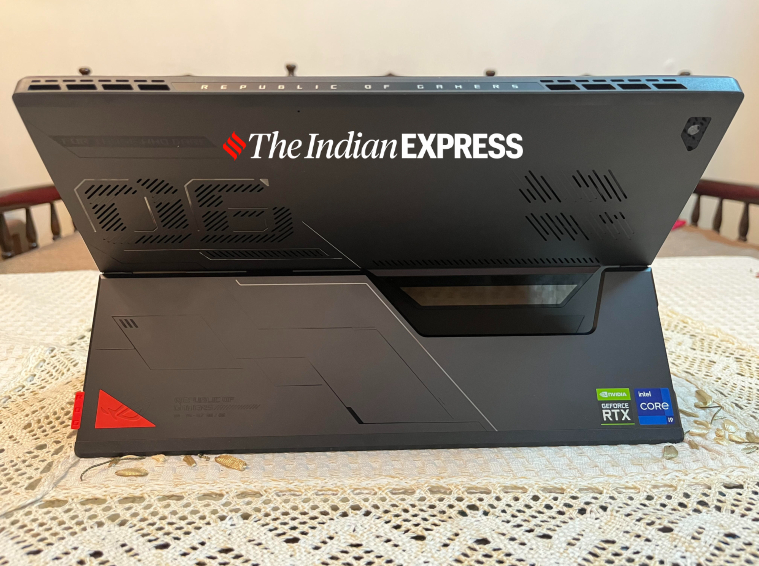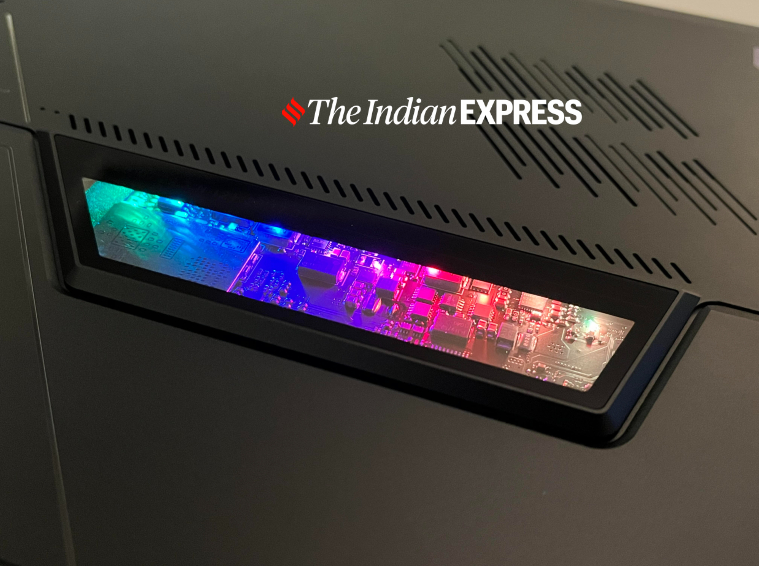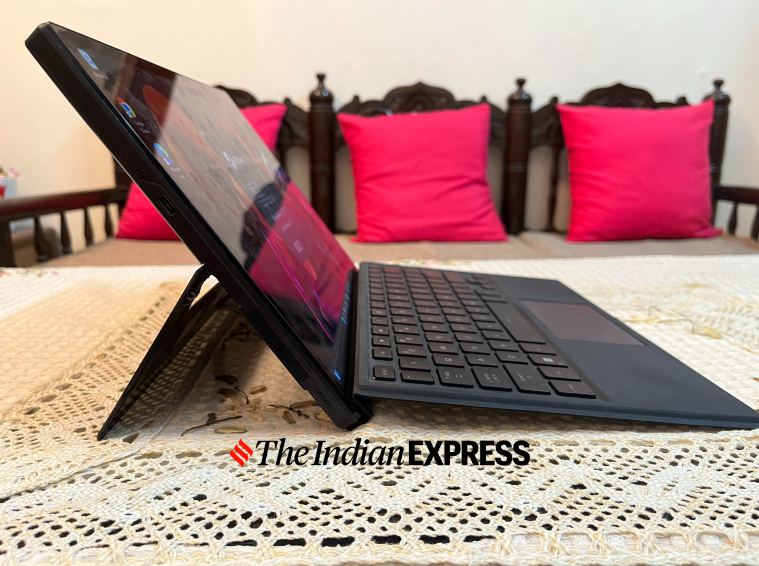[ad_1]
When I reviewed the Flow X13 last year, I was impressed by how Asus achieved both power and portability in a gaming laptop. It was nothing short of a fantasy to see the combination of a gaming laptop and external GPU in a single device. This year, Asus has done something entirely different. Its ROG Flow Z13 is built on the same foundation as the X13, but this new device is a gaming tablet with a detachable keyboard and an optional external GPU. It’s a wild concept, and the device is expensive. It also makes some compromises.
Here is my review of Asus’ ROG Flow Z13.
A Surface Pro-like device with supercharged graphics
The Z13 is the thinnest and lightest pro-level gaming rig I have tested in a long time. It has the aesthetics of a gaming laptop with aggressive cut-outs and an eye-catching design. It looks like the Z13 is made for gamers, and the design says it all. On the back is the rear glass window, beneath which you can see a section of the motherboard highlighted in rainbow-hued RGB lighting. You cannot ignore the small glass panel on the rear, as it adds a certain elegance to the chassis.
The Z13 takes design cues from detachables like Microsoft’s Surface Pro. The display can tilt at different angles with its Surface-like kickstand. It has the same high-quality build quality I expect from a premium laptop. With the keyboard cover (more on that later) attached to the device, Flow Z13 weighs 1.2 kg, making it lighter than traditional gaming laptops. A few years ago, I never thought I could carry a gaming laptop to a cafe, but now it is possible.
 I have used the Flow Z13 for writing, editing photos and videos, gaming, and casual web browsing. The performance is impressive. (Image credit: Anuj Bhatia/Indian Express)
I have used the Flow Z13 for writing, editing photos and videos, gaming, and casual web browsing. The performance is impressive. (Image credit: Anuj Bhatia/Indian Express)
The most important thing for me is that the 2-in-1 form factor vastly improves its usage, especially in scenarios where I need my tablet to be more like a laptop. That said, carrying the Z13 as a standalone tablet feels a little bizarre to me. It is chunkier than most tablets I have used, so the experience does not even come close to the iPad. But the Z13 packs in a discrete Nvidia GPU, so any comparison to the iPad is also unfair.
The Z13 is a full-power gaming PC in a compact shell. A generous array of ports for a tablet/laptop of this size is exceptional. You’ve got a USB 3.2 Gen 2 Type-C port, a USB 2.0 Type-A port, a MicroSD card slot (under the hinge), and a headphone jack. The power button is located above the volume rocker and doubles as a fingerprint sensor. The Z13 lacks an IR camera, something I feel should be included in the price.
A stand-out display and impressive sound
That 13.4-inch screen looks good with great viewing angles too. The 120Hz refresh rate delivers smooth animations and interactions, while the colour accuracy is fantastic, even without any calibration. Unfortunately, the screen doesn’t do that well in direct sunlight and other bright environments.
Sound is also a standout feature on the Z13, with two speakers loud enough to fill my room. They are good enough for watching YouTube videos and casual listening to music, but I recommend getting a good pair of headphones if you want to game on this device.

 The Z13 reminds me of Microsoft Surface Pro 2-in-1. (Image credit: Anuj Bhatia/Indian Express)
The Z13 reminds me of Microsoft Surface Pro 2-in-1. (Image credit: Anuj Bhatia/Indian Express)
RGB keyboard but lacks the punch
Being able to chuck the Z13 in a bag and go anywhere to do your work or play games is an advantage. It takes less than a third of the space of a gaming laptop, and a lot has to do with the form factor and the Type Cover keyboard. I knew comparing the bundled keyboard cover to a regular keyboard on gaming laptops would be an injustice, but I wish the experience could have been better. I am not against the keyboard cover that comes with the Z13.
Keys are stable wherever the fingers hit them. The keys even have some cool RGB lighting effects. A folding magnetic cover provides a bit of protection when you’re carrying your device around, mostly in stopping the screen from getting scratched when it’s in a bag. All good, but the cramped size and shallow keys do not make the typing experience joyful.
Compared to the standalone keyboard, it requires some time to get used to the smaller size keyboard. The difference in size is quite big. While the keyboard is perfectly fine for navigating the web, I wouldn’t see myself writing a long feature copy or using it for gaming. The mechanical feel that most gamers want from a gaming keyboard is missing here. Below is the trackpad. Clicking on the trackpad feels great, but it’s on the smaller side.

 A glimpse of the motherboard inside. (Image credit: Anuj Bhatia/Indian Express)
A glimpse of the motherboard inside. (Image credit: Anuj Bhatia/Indian Express)
Dedicated graphics
As I said in the beginning, there are two parts to the ROG Flow Z13: the tablet and the XG docking station. The idea is simple: when the XG Docking Station plugs in, the Nvidia RTX 3080 Laptop GPU supercharges the system. It essentially adds more graphical power to the device, something gamers want from a juiced-up gaming PC. Unfortunately, Asus sent the Flow Z13 review unit that lacked the XG Docking Station (sold separately), so I cannot tell you how significantly the performance jumps with the XCG docking station connected.
The model I tested featured an Intel Core i9-12900H CPU, an Nvidia GeForce RTX 3050 Ti GPU, 16GB of RAM, and a 1TB SSD, which retails for Rs 181,990. That’s a lot of money for a computing device, even if made to appeal to hard-core gamers.
The Z13 is a complete gaming device that can play games without connecting to the eGPU. I managed to run most modern games at the FHD+ resolution, well above 30 frames per second. The performance is impressive, but I must note the Z13 isn’t as fast as a dedicated gaming laptop or desktop. The Z13’s compact and thin size also results in other compromises. As a result, the battery life on the Z13 is mediocre and will not last a day. During a normal workday, the Z13 lasted less than 5 hours. When playing AAA games, the battery barely lasts an hour.

 Its keys feature one-zone RGB lighting that can be customized with Asus’s Aura Sync panel inside the Armoury Crate app. (Image credit: Anuj Bhatia/Indian Express)
Its keys feature one-zone RGB lighting that can be customized with Asus’s Aura Sync panel inside the Armoury Crate app. (Image credit: Anuj Bhatia/Indian Express)
Is the Asus ROG Flow Z13 worth getting?
No, you shouldn’t buy the Z13, and that’s unfortunate. The Z13 is still highly experimental and far from a device I want to recommend. Yes, it has a clever design, a bright 13.4-inch display, excellent performance, and a decent keyboard. But then the overall execution leaves one wanting. The core issue is that the Z13 tries too hard to fit in both worlds. The Z13 isn’t as powerful as a dedicated gaming laptop that pro-gamers would want. Nor is it small and light as a tablet. And yes, the cost of owning the complete package–if one includes the XG Mobile GPU– makes it way more expensive than capable and powerful gaming laptops on the market.
!function(f,b,e,v,n,t,s)
{if(f.fbq)return;n=f.fbq=function(){n.callMethod?
n.callMethod.apply(n,arguments):n.queue.push(arguments)};
if(!f._fbq)f._fbq=n;n.push=n;n.loaded=!0;n.version=’2.0′;
n.queue=[];t=b.createElement(e);t.async=!0;
t.src=v;s=b.getElementsByTagName(e)[0];
s.parentNode.insertBefore(t,s)}(window, document,’script’,
‘https://connect.facebook.net/en_US/fbevents.js’);
fbq(‘init’, ‘444470064056909’);
fbq(‘track’, ‘PageView’);
[ad_2]
Source link


